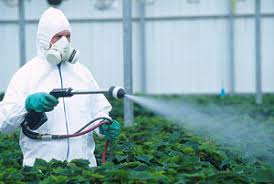Is
the food you eat killing you?
Globally,
one person dies by suicide roughly every 40 seconds.
Around
the world, over one million people commit suicide each year - an
increase of 60 percent over the last four and a half decades.
Incredibly,
farmers have one of the highest rates of self-inflicted death.
Although
factors such as poor yield, financial stress, erratic weather and
animal disease certainly contribute to a high suicide rate in
farmers,
researchers are beginning to suspect another cause: exposure to pesticides.

researchers are beginning to suspect another cause: exposure to pesticides.
20-year study establishes a connection between
depression and conventional farming chemicals
Researchers
at the National Institute of Health completed a historic study
earlier this fall which confirmed that seven pesticides --
some of which are widely used -- contribute to clinical depression in
farmers. Over the last two decades, the team interviewed almost
84,000 farmers and their spouses.
The
findings were startling. Dr. Freya Kamel, lead researcher for the
study, said that two specific types of pesticide were responsible for
the massive uptick in depression -- organochlorine
insecticides and fumigants. Each increases the risk of depression by
an astounding 90 and 80 percent, respectively


. One of the more common varieties is called malathion and is used by approximately 67 percent of the farmers surveyed.
It also just happens to be banned in Europe.
. One of the more common varieties is called malathion and is used by approximately 67 percent of the farmers surveyed.
It also just happens to be banned in Europe.
This
isn't the only study that links pesticides to depression.
"A
group of researchers published studies on the neurological effects of
pesticide exposure in 2002 and 2008. Lorrann Stallones, one of those
researchers and a psychology professor at Colorado State University,
says she and her colleagues found that farmers who had significant
contact with pesticides developed physical symptoms like fatigue,
numbness, headaches and blurred vision, as well as psychological
symptoms like anxiety, irritability, difficulty concentrating and
depression. Those maladies are known to be caused by pesticides
interfering with an enzyme that breaks down the neurotransmitter that
affects mood and stress responses."
In
the end, both studies beg the question: If farmers who utilize
conventional pesticides as part of their profession are experiencing
the damaging consequences of the chemicals, what is the effect on
the general public who ingest the substances through their food?
Thanks for your attention,
I appreciate you,
Riverwatch